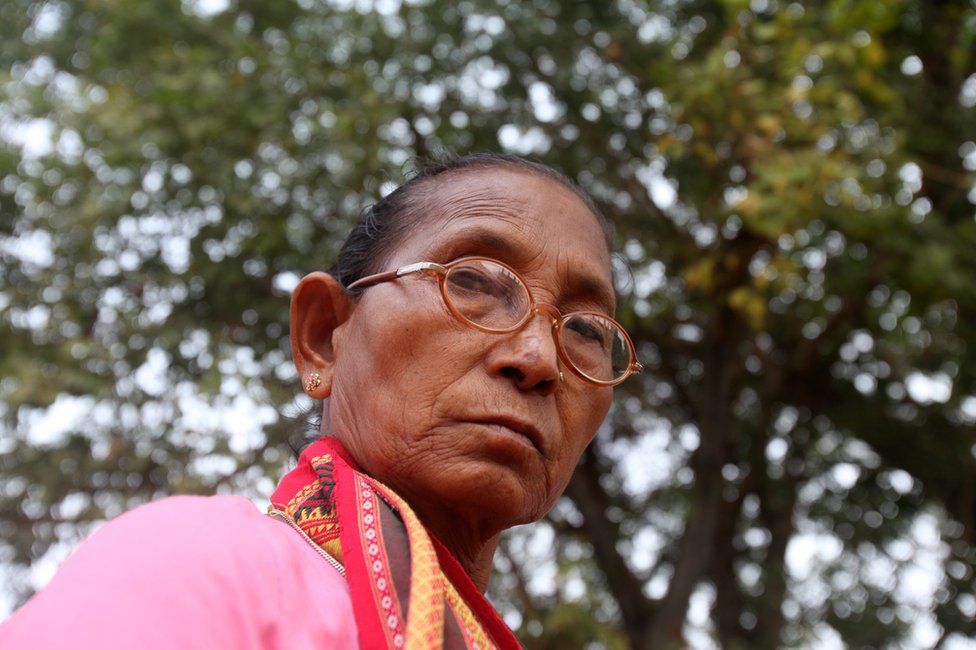The Indian woman who hunts the witch hunters
- Published

Not so long ago, Birubala Rabha believed witches existed.
Growing up, neighbours often told her about evil women, or daini (witches) skulking in the village.
Ms Rabha was six when her father died, forcing her to drop out of school to help her mother, a farm worker in India's north-eastern Assam state.
She was 15 when she got married to a farmer.
Ms Rabha mostly stayed at home, weaving and looking after their three children.
In the mid 1980s her eldest son had a bout of typhoid and she took him to a village quack in Goalpara.
He told her that her son had fallen under the spell of a fairy who was pregnant with their son and that as soon as the child was born, her son would die.
Her son recovered, and months passed without any mishaps. That was when Ms Rabha stopped visiting quacks because she felt they were "frauds".
Unsung Indians
This is the 11th article in a BBC series Unsung Indians, profiling people who are working to improve the lives of others.
More from the series:
But the hushed whispers about witches continued in Ms Rabha's village. A woman accused of practising witchcraft was thrown out of her home.
"I thought there must be some truth in it," recalls Ms Rabha.
Some time later she began working with a local women's group, and heard that a number of women had been branded witches in a neighbouring village.
"That is when I woke up. I went to the village and found that the women had been abused and were on the verge of being thrown out. I met the local leaders and related the story of my son. I told them there were no witches in this world, and the women should not be harassed."
Grisly attack
Witch hunts have been reported from Assam, one of India's most ethnically diverse states, for decades now.
Last year, the home ministry informed the parliament that at least 77 people - mostly women - were killed and 60 others injured in "witch hunting incidents" in Assam since 2010. Last year, in a particularly grisly incident, a feted athlete was branded a witch, tied up and severely beaten. (More than 2,000 'witchcraft murders' have taken place in India since 2000)
Women are often branded witches to help relatives and neighbours grab their land and property, to settle personal grudges, or for denying sexual favours.
In tribal villages where superstition is rife and the public health system is in a shambles, quacks and shamans thrive and conspire with locals to blame women for crop failures, illnesses and natural calamities. Single women, widows or old couples are the main targets.
For the last 15 years, Ms Rabha, a slight and diminutive woman with big-rimmed spectacles and a girlish laugh, has been leading a courageous campaign against witch-hunting.
Tough law
Travelling extensively and braving attacks and ridicule, the indefatigable 66-year-old crusader has spoken at meetings, held awareness camps, and taught school lessons about the dastardly practice. She has stormed police stations and lobbied authorities demanding protection for the victims.
In the past decade, Ms Rabha has rescued some 35 women branded as witches. Her relentless campaign spurred the Assam government last year to bring what many say is India's toughest anti-witch hunting law.
"When Birubala talks, people listen" says Natyabir Das, a doctor and a close aide.
One Sunday afternoon recently, scores people gathered in the rising summer heat in a place called Nabagram to listen to Ms Rabha.
An idyllic village of sloping tin-roofed homes with walls of bamboo latticework skirting a busy railroad track and ringed by jackfruit, banana, rubber and coconut trees, is an unusual place to hold a meeting on the evils of witch hunting
"Women have to fight against superstitions, women have to be vigilant. When you become sick go to a doctor, not a quack. Don't have blind belief in rituals and worships. Worship your gods but don't hate others in the name of your gods. Women can sometimes be their own worst enemy," she tells the crowd.
The crowd, mainly women, listen intently.
Many have been victims themselves. They tell stories of how witch hunting has now even become a lucrative extortion industry, a far cry from old tribal beliefs such as the world is full of disembodied spirits "as a tree is full of leaves".
'Ongoing battle'
Three years ago, Ms Rabha reached Majuli, the world's largest river island, to find that 35 women had been branded as witches.
Later she discovered that they had been made to pay a hefty amount to the local quack for a ceremony to get "rid of the devil" or leave the village. "We went to the police, invoked the law, and saved the women. Then we found out this was a money making racket run by the local quack".
Podumi Rabha, 37, was branded a witch by a quack because her husband's pharmacy was pushing him out of his business.
"They will always find new reasons to brand women as witches," Ms Rabha tells the meeting.
"But don't be scared, challenge the offenders and report them the police. This battle is not going to end anytime soon."